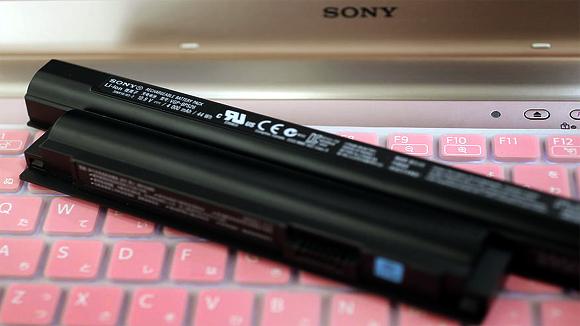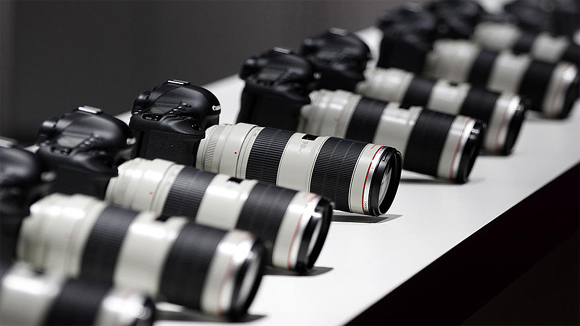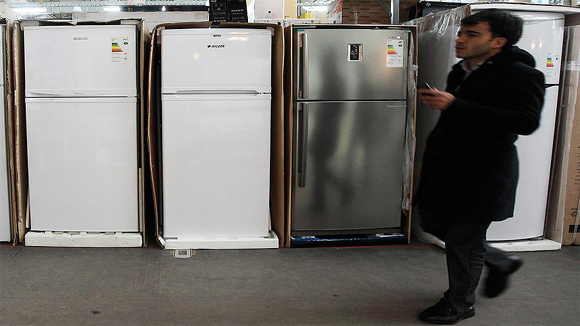Photographs: Michael Buholzer/Reuters
Nanotechnology is appearing in all sorts of places you might not expect.
Here are some of the products benefiting from nano innovations.
Nanomedicine
In the medical field, wound dressings or surgical equipment coated in nano-silver marks only the start of developments.
Although most of the possibilities are at various stages of testing, nanotechnology offers an entirely new approach. For example, nanoparticles could be use to deliver drugs to specific types of cells – like chemotherapy to cancer cells.
Nanoparticles released in the bloodstream might also catch free radicals which occur during allergies and block them. And nano-silicate applied to wounds can reduce bleeding by absorbing the water and causing the blood to clot more quickly.
And nanoshells might be used in lasers to concentrate the beam towards the affected cells without damaging the healthy cells around them.
…
How nanotechnology transforms our everyday lives
Image: Sony's Lithium-ion batteries for Vaio laptops.Photographs: Kim Kyung-Hoon/Reuters
Batteries
Electronic devices that are based on nanotechnology are often more powerful than their conventional counterparts.
Lithium-Ion batteries that have the graphite on the negative electrode replaced with nanomaterial are better suited for storing the lithium ions that would otherwise get lost after many recharges.
The batteries have a high recharge performance and a longer life cycle.
...
How nanotechnology transforms our everyday lives
Photographs: Hazir Reka/Reuters
Clothes and accessories
Nanotechnology can also be found in clothes and other accessories. All kinds of garments are equipped with nanoparticles making them wrinkle-resistant, stain-resistant, waterproof or with woven-in sunscreen.
Special shoe pads are able to absorb food odor. Athletes benefit from special material that leaves their shirts and pants breathable.
Nano-silver can be found in the coating of laundry machines and as an ingredient of the laundry detergent, and serve as a disinfectant to kill germs and bacteria.
...
How nanotechnology transforms our everyday lives
Photographs: Andy Clark/Reuters
Surface refinement
Nanotechnology also allows a special treatment of transparent surfaces like visors, protection goggles or windows to avoid the condensation of water and the resulting fogging. Nano-silicone is embedded in a layer of polymer and applied to the transparent surface.
The particles prevent the water particles from sticking and absorbing the light that would otherwise shine through.
Next to this anti-fogging effect, surfaces treated with nanoparticles also imitate the characteristics of the leaves of the lotus flower. Tiny irregularities in the surface structure prevent water from sticking – it rather bounces off and leaves no traces behind.
...
How nanotechnology transforms our everyday lives
Photographs: Mansi Thapliyal/Reuters
Computer equipment
For the development of computer chips, smaller and faster isn’t good enough any more. Heat reduction is the new buzzword.
To allow the microchips to cool down despite the huge amount of data that is shot through them, carbon nano tubes could serve as heat sinks and prolong the lifetime of chips and processors.
Hardware like notebooks, mouses or keyboards are often coated in a thin layer of nano-silver, again using the antibacterial characteristics of the particles.
Flatscreens are made even flatter by nanotech-tubing with polymer films – the light-emitting diodes equipped with these are simply smaller and lighter.
...
How nanotechnology transforms our everyday lives
Photographs: Kim Kyung-Hoon/Reuters
Photography and film
Camera manufacturers have also discovered the advantages of nanotechnology.
Photo lenses are made less reflective and less prone to fogging with a special hydrophobe nano coating. Photo paper with a nano-ceramic surface can make printed photos last longer.
They are resistant to heat, humidity, light and ozone and other influences that would make them fade after some time.
...
How nanotechnology transforms our everyday lives
Image: Red Sox pitcher Daisuke Matsuzaka sprays sunscreen on his face during a spring training game against the Dodgers in Vero Beach, Fla.Photographs: Hans Deryk/Reuters
Cosmetics and skin care
Nanotechnology in cosmetics first appeared over 40 years ago, when moisturising creams included liposomes that entered the skin cells to deliver water. Ever since, nanotechnology has spurred innovation in eye, hair, and skin care.
Although considered risky by many experts, nanoscale zinc oxide particles are used in sunblocks to absorb UV light.
...
How nanotechnology transforms our everyday lives
Image: A man walks past refrigerators on sale at a store in Istanbul.Photographs: Osman Orsal/Reuters
Food preparation and refrigeration
Nano-silver is known for its antibacterial characteristics.
To prevent germs from spreading too quickly in the kitchen, nanotechnology is used in a multitude of appliances from kitchenware to cooking supplies, from refrigerators to laundry machines.
They are all treated or infused with silver particles that render them resistant to many germs and bacteria and prevent food from spoiling or surfaces from becoming moldy.









article